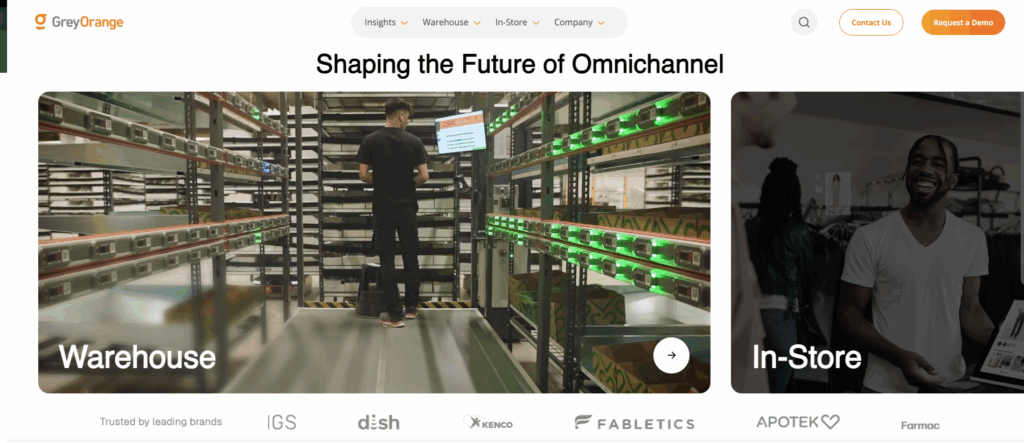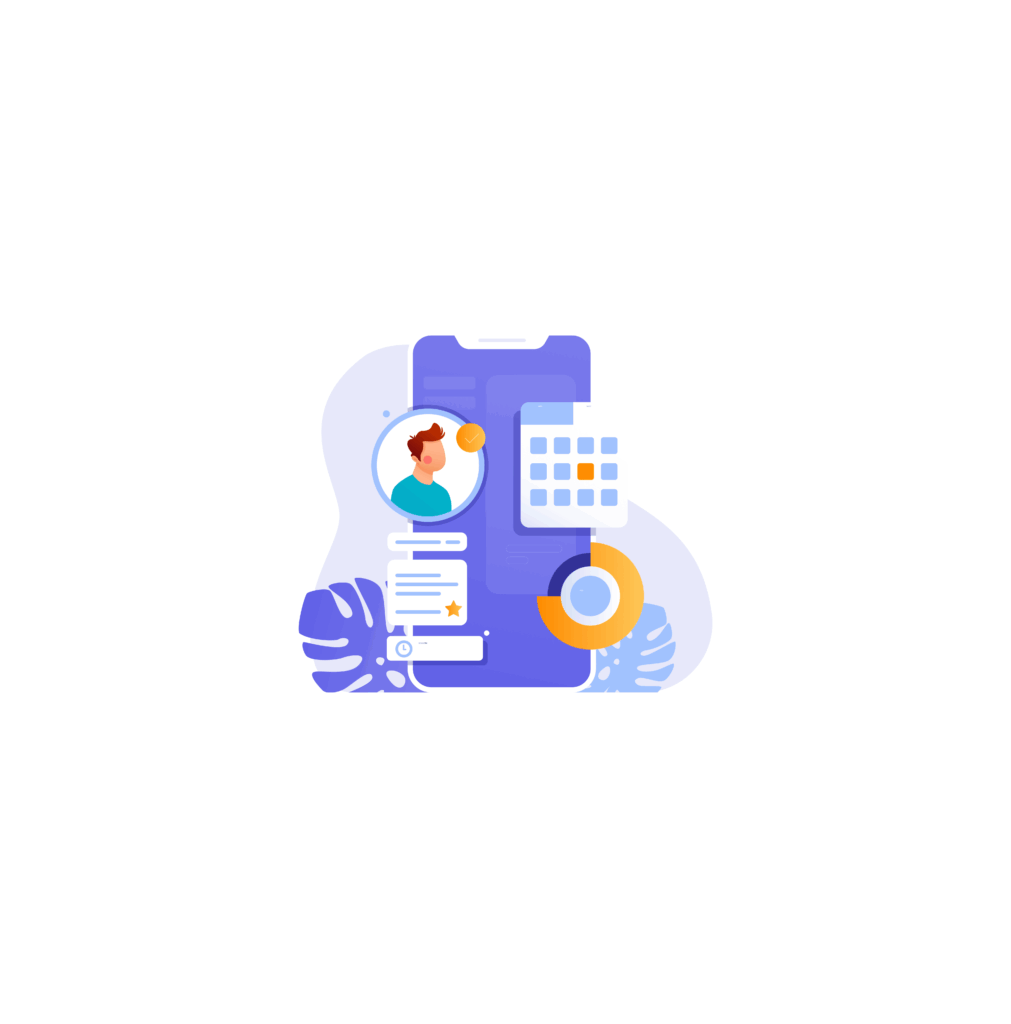Logistics is an over $10 trillion industry that keeps the world running. The industry’s full-scale revolution is driven by the growth of e-commerce and soaring customers’ expectations. Yet, most companies still rely on manual processes, guesswork for demand planning, and reactive (instead of proactive) problem-solving.
This has led many companies to struggle with inefficient processes, rising costs, and unpredictable disruptions. However, that’s changing fast with AI helping the top logistics players. AI in logistics is a transformative force reshaping the supply chain industry through predictive analytics, automation, and real-time decision making.
Leading enterprises such as DHL, Amazon, Maersk, and FedEx are already leveraging AI to reduce their delivery time with optimized routing, cutting fuel consumption using AI-driven fleet management, and minimizing warehouse errors via smart robotics.
In this post, you’ll discover how exactly these supply chain companies are disrupting the overall logistics industry, and the exact benefits you can expect from using custom AI solutions for your logistics operations.
Understanding AI in Logistics
AI in logistics refers to integrating machine learning, data analytics, and automation to optimize supply chain operations. AI is significant to logistics because of its ability to forecast demand, manage inventory, and optimize delivery routes. It enables logistics companies to operate more efficiently and respond swiftly to changing market dynamics.
AI-powered route optimization has resulted in a 10-30% reduction in last-mile delivery time for logistics companies like Amazon. Implementing AI in logistics represents a fundamental shift in how goods are moved, stored, and delivered worldwide.
AI-powered logistics management software adapts in real-time and provides flexibility even when the demand spikes unexpectedly. Moreover, these innovative solutions can streamline and drive efficiency with data-driven operations, helping logistics companies thrive in the fast-moving modern supply chains.
Key Benefits of AI in Logistics
1. Better Operational Efficiency
A logistics system requires working as a symphony to provide an efficient result, but the traditional system often fails to do so. That’s where AI takes over as a real-time data-driven mechanism. It automates repetitive tasks like data entry, shipment tracking, and warehouse sorting, detects inefficiencies, and dynamically adjusts operations based on new inputs. It helps teams work faster and more accurately.
For example, AI can suggest the best routes for drivers or quickly adjust warehouse layouts to speed up packing and dispatching. Similarly, robotic process automation (RPA) can even streamline inventory updates.
2. Cost Reduction
AI saves both time and money. With smarter route planning based on traffic, weather, and historical delays, companies can save on fuel expenses and improve on-time deliveries. It can further predict demand surges or dips, reducing storage costs, and avoid overstocking or running out of goods.
AI helps avoid costly last-minute decisions, making operations leaner and more budget-friendly. Think of it as moving from guesswork to guided precision.
3. Improved Customer Satisfaction
Today’s customers expect fast and accurate deliveries. AI empowers logistics providers with real-time tracking and delivery updates. Logistics providers can even provide notifications on delays and routing options. This kind of transparency builds trust, reduces support tickets, and improves the overall customer experience. It can further lead to organic growth.
4. Smart Risk Management
Delays and disruptions are common in logistics, from weather issues to supplier problems. AI models assess risk factors across geographies, suppliers. It then offers contingency plans like rerouting deliveries or switching suppliers or carriers. Such predictive insight helps logistics leaders manage the risks and keep everything on track.
5. Promote Sustainability
Green logistics isn’t just a trend, it’s a necessity. AI supports eco-friendly logistics by optimizing delivery loads, reducing unnecessary trips, and suggesting the most fuel-efficient paths. Some companies even use AI to analyze carbon footprint in real-time and recommend greener practices, such as shifting from trucks to rail for long hauls.
The result: lower emissions, happier regulators, and a stronger brand image in an increasingly eco-conscious world. This can be a win for both business and the environment.
6. Scalability and Adaptability
As your logistics network grows, so do logistics challenges. AI makes it easier to handle more orders, new regions, or seasonal spikes without hiring huge teams. It adjusts to new product lines, regions, and even customer behavior. Whether you’re adding five new delivery zones or shifting operations, AI allows you to adjust strategies in real-time. It’s like having a 24/7 analyst who keeps you one step ahead of the curve, helping companies grow smoothly and stay competitive.

Top AI Tools for Logistics Companies
Adopting AI in logistics doesn’t mean reinventing the wheel — many tools are already out there, ready to plug into your operations. Here are some of the most popular and powerful AI tools logistics companies are using today:
1. ClearMetal
ClearMetal sees the future of your supply before it happens. It uses AI to give real-time visibility across your entire supply chain. It predicts delivery delays, optimizes inventory, and helps you make proactive decisions using data from multiple sources. Great for companies needing smarter demand forecasting and proactive logistics.
2. Llamasoft (a Coupa company)
Llamasoft is known as the supply chain simulator. This can test your logistics strategy before you risk it. It runs “what-if” simulations to answer tough questions like: “What happens if fuel prices rise?”, “Where should we place warehouses for peak season?“, “What’s the most cost-effective shipping mode?”.
Llamasoft is best for enterprises focused on long-term supply chain planning and cost optimization.

3. Route4Me
This tool is ideal for delivery-focused logistics companies. Route4Me uses AI to find the most efficient delivery routes based on distance, traffic, and customer time windows. AI calculates the fastest, cheapest delivery paths and analyzes fuel-efficient stop sequences. Route4Me saves fuel, time, and resources. Best for businesses with large delivery fleets and tight schedules.
4. Sixfold (by Transporeon)
Sixfold provides real-time shipment tracking. It uses AI to provide live updates on where your shipments are and when they’ll arrive. Sixfold provides live GPS tracking for all shipments, early delay alerts like port congestion or weather risks, and predictive ETAs that update automatically. The goal of Sixfold is to flag delays before they become a problem. It’s like having a smart assistant watching over every truck.
5. GreyOrange
GreyOrange combines AI and robotics to power warehouse operations. It automates picking and packing with 99.9% accuracy, can sort 500+ items per hour per robot, and cuts fulfillment costs by 25-40%. It’s ideal for businesses that want to speed up order fulfillment without increasing labor costs. High-volume e-commerce and retail logistics can benefit from GreyOrange.

6. Elementum
When logistics emergencies strike, Elementum has your back. It spots risks like customs holds or truck breakdowns. Elementum uses AI to alert the right team and suggest the best way to fix it. It also recommends data-backed solutions and tracks resolution progress in real-time. It’s built to keep things moving smoothly when the unexpected hits. Best for global businesses facing complex cross-border logistics.
Custom AI Solutions
While off-the-shelf AI tools offer quick wins, custom AI solutions unlock much deeper value, especially for logistics companies dealing with unique supply chain challenges. Think of them as a tailored suit instead of something off the rack. They’re built specifically to match your business model, operations, data, and growth goals.
With custom AI systems, you can solve your unique challenges. For instance, if your business needs to predict delivery delays based on region-specific weather patterns and vendor history, a custom AI model can combine those exact data points and learn from them over time. You can gain sharper insights, fewer delays, and a competitive edge.
Here’s what custom AI in logistics can do for you:
- Automate warehouse tasks based on your workflows
- Analyze your internal shipping data to optimize carrier usage
- Forecast demand for specific SKUs in different geographies
- Detect fraud or anomalies in real-time across your vendor network
- Integrate seamlessly with your existing SaaS for supply chain management
You might be thinking that a tailored SaaS in supply chain management to be expensive, however, the surprising part is that such AI solutions can lead to long-term savings. You can cut labor costs through intelligent automation, reduce inventory holding costs with accurate forecasting, and minimize costly disruptions with real-time detection.
Many businesses that integrate AI capabilities report 2-3 times greater ROI within 6–12 months of implementing custom models, especially when applied across multiple supply chain touchpoints.

Real-World Applications of AI in Logistics
AI is transforming day-to-day operations across the logistics and supply chain industry. From warehouses to global freight giants, companies are using tailor-made AI models to solve specific challenges.
1. Dynamic Route Optimization
UPS developed a custom AI-powered system called ORION (On-Road Integrated Optimization and Navigation), which analyzes real-time traffic, weather, and delivery data to optimize driver routes. It helps save an estimated 10 million gallons of fuel annually and has reduced mileage by over 100 million miles per year. While the estimated full deployment cost was $250 million, integrating ORION saved more than $320 million in operational costs.
2. Boosting Shopping Experience
Walmart uses AI and ML models for its inventory management system. The model enables to strategic placement of holiday items across stores, optimizing the entire shopping experience. Moreover, the company also considers ‘future data’ such as macroweather patterns and macroeconomic trends to forecast demand at the store and SKU level. It ensures that their customers can rely on them to deliver great experiences and savings all season long.
3. Smart Warehouse Automation
UK-based online grocery retailer Ocado uses AI-driven robots and a custom-built control system to sort, store, and retrieve grocery items with extreme efficiency. Their warehouses are known for processing 65,000 orders per week, with one of the most advanced AI-backed logistics systems in retail.
4. Predictive Maintenance
Rolls-Royce, in partnership with Microsoft, developed an AI system to monitor engines and logistics fleet conditions in real-time. The system can track more than 10,000 engine parameters with exceptional data quality. The predictive maintenance solution prevents breakdowns before they occur, significantly reducing downtime and operational costs.
Challenges and Considerations
Navigating the AI revolution in logistics isn’t as simple as flipping a switch. It comes with both expected and unexpected hurdles. Our goal is to anticipate such challenges and turn them into opportunities.
Here are some key considerations logistics companies should keep in mind:
1. Data Quality and Availability
AI runs on clean, structured, and abundant data to provide the best results. But many logistics companies still operate on fragmented systems, spreadsheets, or siloed databases. Without unified, high-quality data, AI models struggle to deliver accurate predictions or insights.
Solution:
Start with a data audit before implementing AI. We can help you map out your data sources, fix inconsistencies, and centralize data before deploying AI. Instead of implementing AI in the overall system, you can first use AI for a single area, such as demand forecasting, to prove value before scaling.
2. High Initial Costs
While AI delivers long-term savings, the upfront costs can be a barrier, especially for custom solutions. Between hiring talent, upgrading infrastructure, and training models, the investment can feel steep for small to mid-sized logistics firms.
Solution:
Focus on phased implementation. Start small (e.g., route optimization or demand forecasting) before investing in bespoke solutions. You can also collaborate with AI vendors that offer scalable pricing models.
3. Integration with Legacy Systems
Many logistics providers rely on older software and manual workflows. Integrating AI with these legacy systems can lead to clunky workflows or even breakdowns.
Solution:
Choose AI solutions (or SaaS platforms with AI) that offer flexible APIs. Focus on the hybrid transition that allows for gradual modernization of the system while using middleware to bridge gaps.
4. Lack of In-House Expertise
AI isn’t plug-and-play. Building or even managing AI tools requires skilled data scientists, machine learning engineers, or technical consultants. Many logistics team faces a skill gap that can slow down adoption or lead to poor implementation.
Solution:
A smart way to overcome the AI talent gap is through staff augmentation, where experienced AI professionals join your team temporarily to accelerate implementation. Instead of investing heavily in hiring or training, many companies now partner with AI-focused teams or use AI-as-a-Service (AIaaS) models. You can gain access to expert support while keeping costs and timelines in check.
5. Security and Compliance
AI in logistics handles sensitive data, including customer details, shipment records, and supplier contracts. Ensuring data privacy, regulatory compliance (e.g., GDPR), and cybersecurity is essential, especially when using third-party tools or cloud-based solutions. A breach of such compliance could spell disaster and add financial burden for the company.
Solution:
Choose AI tools that meet strong security protocols such as GDPR, CCPA, and industry-specific standards. You need to regularly audit compliance as part of your implementation plan. Work with zero-trust mindset and implement strict access controls and real-time monitoring for AI-driven processes.

Future Trends in AI and Logistics
The future of logistics is increasingly being shaped by advanced AI technologies like generative AI, autonomous vehicles, and intelligent digital twins. These innovations will go beyond automation to deliver predictive, self-learning systems that optimize every touchpoint, from real-time supply chain planning to automated last-mile delivery.
As companies adopt AI-powered robotics, drones, and smart warehouses, logistics will shift from reactive to proactive operations, improving speed, accuracy, and sustainability. Additionally, the rise of AI-integrated SaaS for supply chain management is enabling businesses of all sizes to access enterprise-grade logistics intelligence without building from scratch.
You can expect tighter collaboration across global supply chains, hyper-personalized delivery experiences, and AI agents that can negotiate, manage inventory, and respond to disruptions autonomously. Companies that invest early in these future-facing solutions will set the standard for agility and efficiency in a fast-changing market.
Build Smarter, Move Faster with AI in Logistics
AI is no longer a buzzword in logistics; it’s driving real results in logistics. From predictive demand forecasting to intelligent route optimization, businesses that embrace AI are outperforming the market in speed, accuracy, and efficiency.
Of course, adopting AI comes with challenges, including data readiness, integration complexity, and finding the right team. But with the right guidance and implementation, the payoff is clear: lower operational costs, faster deliveries, and smart decision making at every step.
And unless you already have a dedicated AI and logistics team in-house, partnering with the right tech experts can make all the difference. You don’t just need someone to write code, you need a team that understands the logistics ecosystem, regulatory landscape, and how to turn raw data into real-time, actionable intelligence.
At Asterdio, we help logistics companies turn complex challenges into intuitive, AI-driven solutions. Whether it’s one process or your entire supply chain, get guidance from strategy to scale for your logistics management.


